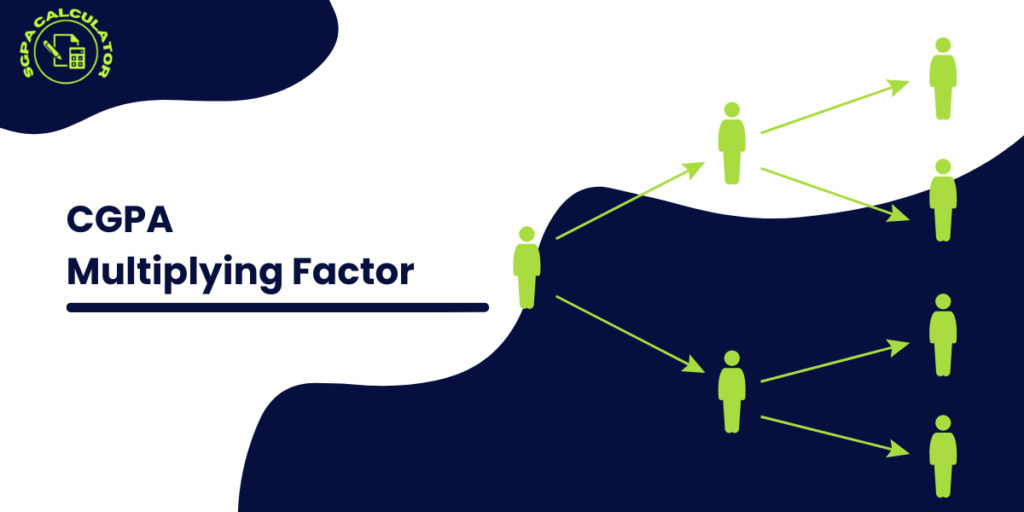The Cumulative Grade Point Average (CGPA) is a common factor among the several metrics and grading systems that are used in the academic world. A candidate’s ability is evaluated by educational institutions, employers, and scholarship committees using their CGPA, which is an essential measure of their total academic success.
The idea of a CGPA multiplication factor has been more well-known in recent years, which has complicated the interpretation and use of these grades. In order to better understand the importance of the CGPA multiplying factor, as well as its ramifications for students and the academic community at large, this article will examine it.
Use Calculator: CGPA Calculator
Understanding CGPA
Understanding the basics of CGPA is crucial before exploring the CGPA multiplying factor. A student’s CGPA is a numerical assessment of their academic achievement that is often generated on a scale from 0 to 4, or 0 to 10, depending on the grading scheme that the school uses. A specific amount of credit hours are allotted to each course, and the grade points are calculated by multiplying the credit hours by the grade earned in each course. The average of these grade points across all courses is then used to calculate the CGPA.
Role of CGPA in Academic and Professional Settings
The influence of a student’s CGPA on their academic trajectory and future employment opportunities is significant. It is essential for advanced degree programme acceptance, scholarship eligibility, and hiring by prospective companies. Academic brilliance is frequently linked to a high CGPA, which shows how well a student can absorb and apply information.
CGPA Multiplying Factor
Academic performance is evaluated in a more sophisticated way thanks to the CGPA multiplying factor. Institutions may apply a multiplication factor to specific courses, semesters, or programmes instead of evaluating all CGPAs equally. This factor, which represents the perceived difficulty or significance of particular elements of a student’s academic record, is added to the CGPA to modify its overall influence.
Use Calculator: SGPA Calculator
Factors Influencing the CGPA Multiplying Factor
Several factors contribute to the determination of the CGPA multiplying factor. These may include:
Course Difficulty Level:
Courses that are deemed more challenging or rigorous may be assigned a higher multiplying factor to acknowledge the additional effort and aptitude required for success.
Program Importance:
Some institutions prioritize certain programs or majors, assigning a higher multiplying factor to courses within these programs to reflect their significance in the overall academic landscape.
Industry Relevance:
In fields where practical skills and real-world application are paramount, institutions may adjust the multiplying factor to align with the industry’s expectations and standards.
Semester Weightage:
Institutions might assign varying weightages to different semesters, considering factors such as the progression of difficulty throughout the academic program.
Use Calculator: GPA Calculator
Implications for Students
Understanding the CGPA multiplying factor is crucial for students as it directly influences their academic standing and future opportunities. Students should:
Strategically Plan Coursework:
By being aware of the multiplying factors, students can strategically plan their coursework, balancing challenging courses with those that may have a lower multiplying factor.
Seek Academic Support:
For courses with higher multiplying factors, students may need to seek additional academic support, such as tutoring or study groups, to ensure success.
Evaluate Program Choices:
Prospective students should consider the CGPA multiplying factors when choosing a program, as this can impact the overall competitiveness of their academic profile.
Advocate for Fairness:
Students should engage with academic institutions to ensure that multiplying factors are applied fairly and transparently, preventing any potential biases.
Conclusion
The traditional notion of academic success is made more difficult by the CGPA multiplying factor. The multiplication factor becomes an increasingly important feature in determining the makeup of the educational environment as institutions look for more complex ways to evaluate students. Students can proactively manage their academic journey by comprehending and negotiating the ramifications of this aspect and making well-informed decisions that are in line with their aims and desires. The CGPA multiplication factor is proof of the dynamic character of educational assessment, reflecting the complex nature of knowledge acquisition and application, as the academic environment continues to change.





